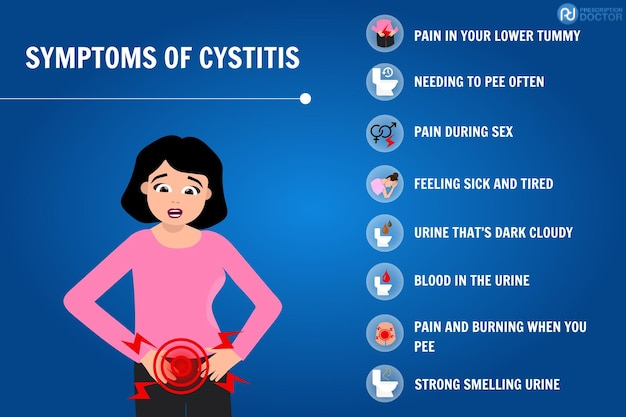Why Do I Keep Getting Cystitis? Recurrent Cystitis Explained
Table of contents:
- What is Recurrent Cystitis?
- Why Do I Get Persistent Cystitis?
- Why Do I Keep Getting Cystitis After Sex?
- How Can Pregnancy Cause Cystitis?
- How Can a Catheter Cause Cystitis?
- Diabetes and Cystitis: What's the Connection?
- What Causes Cystitis in Older Women?
- Tips for Reducing the Chances of Recurring Cystitis
- When Should I Go to the Doctor About Recurrent Cystitis?
- Recurrent Cystitis: Frequently Asked Questions
- Essential Cystitis Support from Prescription Doctor
Cystitis is a common type of Urinary Tract Infection (UTI) that typically lasts around 3 days. It’s usually caused by bacteria known as Escherichia coli (E. coli) entering the urethra (the tube that carries urine out of the body) and travelling up, which can irritate the bladder.
Generally, women are more likely to have cystitis than men; the NHS believes this is because a woman’s urethra is shorter and closer to the anus, meaning bacteria have less far to travel in order to reach the bladder. While not typically a cause for concern, cystitis can be uncomfortable and sometimes painful. Along with some soreness, you may also experience flu-like symptoms.
Some people suffer from recurrent cystitis, which doctors classify as three or more occurrences in a year, or two episodes within a six-month period. If you find yourself in this situation, you may be asking, “Why do I keep getting cystitis?” and searching for answers.
In this article, we’ll explore some common reasons for recurring cystitis and the actions you can take to try to prevent it from coming back. Read on to find out more.
What is Recurrent Cystitis?
Recurrent cystitis is generally defined as having two or more episodes of a urinary tract infection (UTI) within six months, or at least three episodes within a year. It may also be called recurrent UTI, as cystitis itself is a UTI.
Cystitis is extremely common, with approximately one in three women experiencing it before the age of 24. About 26% of women will experience a recurrence within six months after treatment of their initial infection. Studies have found that 53% of women aged 55 and older and 36% of younger women reported another infection within 1 year.
It's a frustrating condition that affects a significant number of women and can seriously impact quality of life, with increased risk of complications for the elderly and those with impaired immune systems or other conditions.
Why Do I Get Persistent Cystitis?
Unfortunately, some people are more predisposed to cystitis than others, and they may suffer from it more frequently. In such cases, a doctor may need to establish a long-term treatment plan.
There are also several things which could be increasing your risk for cystitis:
- Sexual intercourse
- Contraceptive diaphragm
- Pregnancy
- Age
- Diabetes
- Urinary catheter
- Wiping back to front, instead of front to back
In the following sections, we'll answer some common questions about the causes of persistent cystitis outlined above.

Why Do I Keep Getting Cystitis After Sex?
If you find yourself dealing with cystitis within a day or two of having sex, you're far from alone. During sex, bacteria (usually E. coli from your bowel) can get pushed up through your urethra and into your bladder. Because women have a shorter urethra that's positioned close to the anus, bacteria have an easier route to travel.
Studies show that frequent sexual intercourse is a strong risk factor, and sex-related cystitis accounts for around 60% of recurrent cases. Using spermicides or a diaphragm, insufficient lubrication, and having a new partner can all increase your risk.
Simple steps like urinating before and after sex, staying hydrated, and using plenty of lubrication can make a difference. If infections keep happening after sex, your doctor might suggest taking a single antibiotic dose within two hours of intercourse.
How Can Pregnancy Cause Cystitis?
Pregnancy creates the perfect conditions for urinary infections, affecting around 2% to 15% of expectant mothers. Your hormones are partly to blame, as progesterone relaxes the muscles of your urinary tract, slowing urine flow. At the same time, your growing baby physically presses on your bladder, making it harder to empty completely.
When urine remains in your bladder for a longer period, bacteria have more time to multiply. Research shows that 25% to 40% of pregnant women with bacteria in their urine (even without symptoms) will develop a full-blown infection if left untreated.
This is why your midwife or doctor routinely checks your urine during pregnancy. Catching and treating infections early protects both you and your baby from complications like preterm birth.
How Can a Catheter Cause Cystitis?
Catheters are among the main culprits in hospital-acquired infections, accounting for about 75% of UTIs that develop in healthcare settings. A catheter essentially gives bacteria a direct route into your bladder, bypassing your body's natural defences. Each day it stays in place increases your risk of infection by 3% to 7%.
Bacteria stick to the catheter surface and form “protective communities” that are difficult to treat. They can enter during insertion, from contamination, or if urine flows backwards from the drainage bag. The longer a catheter is in (especially beyond six days), the higher your risk. This is why hospitals focus on only using catheters when absolutely necessary and removing them as quickly as possible.
Trimethoprim UTI Tablets
- Effectively treats cystitis
- Short course of treatment
- No extra cost
Diabetes and Cystitis: What's the Connection?
If you have diabetes, you're significantly more likely to develop urinary tract infections compared to people without diabetes. High blood sugar creates a nutrient-rich environment in your urine that bacteria love. Additionally, nerve damage from diabetes can affect your bladder, making it difficult to empty completely. The longer the urine sits there, the more bacteria can grow.
Recent research shows that diabetes also weakens your body's natural antimicrobial defences in the urinary tract. Your white blood cells don't function as well, and your body produces fewer of the protective substances that normally fight off bacteria. This means infections become more serious more quickly.
People with diabetes face higher risks of complications like kidney infections and bloodstream infections. The key is to keep your blood sugar well-controlled and seek prompt treatment if you develop any urinary symptoms.
What Causes Cystitis in Older Women?
After menopause, recurrent cystitis becomes much more common – affecting more than half of postmenopausal women. The main reason is the drop in oestrogen that happens during menopause. Oestrogen keeps the tissues around your bladder and urethra thick, moist, and healthy. It also supports protective bacteria, such as Lactobacillus, which normally prevent harmful bacteria from taking hold.
When oestrogen levels fall, these tissues become thinner and drier, and you lose those protective bacteria. Your vaginal environment also changes, becoming less acidic, which allows harmful bacteria to thrive more easily.
Weakened pelvic floor muscles can lead to incomplete bladder emptying and leakage, both of which increase infection risk. The good news is that vaginal oestrogen therapy (applied as a cream, pessary, or ring) can reduce your risk of recurrent UTIs.
Tips for Reducing the Chances of Recurring Cystitis
The best way to reduce your risk of recurring cystitis is to flush out and prevent bacterial buildup. Try the following tips:
- Avoid using scented soaps on intimate areas
- Try showering rather than bathing
- Drink lots of water
- Go to the toilet as soon as possible and empty your bladder fully
- Always ensure you wipe front to back
- Urinate as soon as possible after sex
- Wear loose, comfortable underwear made of breathable fabric
For more information on preventing cystitis, please refer to our dedicated article.

When Should I Go to the Doctor About Recurrent Cystitis?
If self-help measures aren’t enough to combat your cystitis symptoms, it’s essential to ask your clinician for further advice. This is especially true if you’re still experiencing discomfort after 3 days, as you may need a course of antibiotics to fully clear the infection. Potential treatments include Trimethoprim and Nitrofurantoin.
You should also consult a doctor or healthcare professional if you experience symptoms such as fever, blood in your urine, or back pain. These could be signs of a kidney infection, which will require medical treatment.
If you suffer from recurring abdominal pain and struggle to urinate frequently, you may be suffering from interstitial cystitis, a bladder condition that usually affects middle-aged women. Since this issue isn’t caused by bacteria, antibiotics will have no effect. In this situation, it’s essential to contact a doctor for an accurate diagnosis.
Recurrent Cystitis: Frequently Asked Questions
If you're dealing with recurrent cystitis, you likely have numerous questions about prevention, treatment, and what may be exacerbating the condition. Below, we've answered some of the most common queries we hear from people struggling with repeat infections.
Does Cranberry Juice Help Cystitis?
The evidence on cranberry juice is mixed, but recent research suggests it may help prevent recurrent cystitis in some women. Cranberries contain compounds called proanthocyanidins (PACs) that may stop bacteria from sticking to your bladder wall, provided it is high-quality. However, cranberry products won't cure an active infection; you'll still need antibiotics for that.
Nitrofurantoin (Macrobid) UTI Antibiotics
- Kills bacteria
- Short course treatment
- Eligible for next-day delivery
Bear in mind that many cranberry juices contain high amounts of sugar, which could actually feed bacteria, so supplements or concentrated products might be better options.
Why is My Cystitis Not Getting Better?
If your cystitis isn't improving after 48 hours of antibiotics, several factors may be to blame. You may have antibiotic-resistant bacteria (rendering the prescribed antibiotic ineffective), or the problem could be interstitial cystitis, a condition that causes similar symptoms but won’t respond to antibiotics. There might also be an underlying cause, like a kidney stone or incomplete bladder emptying.
If your symptoms persist or worsen despite treatment, you can request a urine culture test to identify the specific bacteria and determine the most effective antibiotic.
Can Dehydration Cause Cystitis?
Dehydration doesn't directly cause cystitis, but it is a risk factor that increases the likelihood of infections. When you're dehydrated, you produce less urine, which means bacteria aren't flushed out of your bladder as frequently. The urine you do produce is more concentrated and sits in your bladder longer, giving bacteria more opportunity to multiply.
Staying well-hydrated helps your body's natural defence mechanism, as regular urination physically washes bacteria out of your urinary tract. Aim for around 2 litres of water daily to keep your urinary system functioning properly and reduce your risk of infection.
How Do You Know if You Have Cystitis?
The classic signs of cystitis are quite distinctive. You'll typically experience a burning or stinging sensation when you urinate, along with a need to urinate much more frequently than usual, often with only small amounts coming out each time. Your urine may also appear cloudy or darker than usual and have a stronger odour.
Additionally, you may experience an urgent, sudden need to urinate that's difficult to control. Many people also experience discomfort or pain in the lower abdomen, just above the pubic bone.
If you develop a fever, back pain, or feel generally unwell, this could signal a kidney infection; seek medical attention promptly. A simple urine test at your doctor's can confirm cystitis.

Can Constipation Cause Cystitis?
Yes, constipation can contribute to cystitis, though it doesn't directly cause it. Your rectum and bladder are positioned very close together. When your bowel is full of stool, it physically presses on your bladder, which can prevent complete bladder emptying when you urinate. Urine left sitting in the bladder gives bacteria more time to grow.
The pressure can also cause urine to flow backwards from the urethra into the bladder, potentially carrying bacteria with it.
Essential Cystitis Support from Prescription Doctor
If you constantly find yourself asking, “Why do I keep getting cystitis?” the important thing is to remember that you’re not alone. Specialist support is available from Prescription Doctor.
We offer a range of effective treatments, including those suitable for cystitis in men, so you can get the relief you need as hassle-free as possible. Simply complete our online medical questionnaire, and we’ll take care of the rest. This can be done at your own convenience, from the comfort of your own home, so there’s no need to make an appointment.
Our experienced clinicians will review your answers and determine whether your chosen treatment is suitable for your circumstances. If not, an alternative solution may be recommended. Orders approved before 3pm on a weekday are eligible for next-day delivery, while everything dispatched from our UK-based General Pharmaceutical Council-registered dispensing pharmacy is sent in plain packaging for total discretion. It’s that straightforward.
Additionally, our clinicians are available to address any questions you may have about cystitis, such as how to prevent it or manage it if the condition develops. Whatever you need, you can rely on us for assistance.
Take control of the situation today. Start a consultation with Prescription Doctor and let us take the hassle out of your healthcare.
Sources
- NHS: Cystitis.
- American College of Obstetricians and Gynecologists (2023): Urinary Tract Infections in Pregnant Individuals. ACOG Clinical Consensus.
- Centers for Disease Control and Prevention (2025): Catheter-associated Urinary Tract Infection (CAUTI) Basics.
- Kidney International (2016): Insulin and the phosphatidylinositol 3-kinase signaling pathway regulate Ribonuclease 7 expression in the human urinary tract.
- Antimicrobial Resistance and Infection Control (2014): Catheter-associated urinary tract infections. Antimicrobial Resistance and Infection Control.
- PubMed (2015): Urinary tract infections in patients with type 2 diabetes mellitus: review of prevalence, diagnosis, and management.
- Clinical and Experimental Obstetrics & Gynecology (2005): Sex-induced cystitis--patient burden and other epidemiological features.
- Therapeutic Advances in Urology (2019): Risk factors and predisposing conditions for urinary tract infection.
- NIH (2025): Recurrent Urinary Tract Infections.
- Family Medicine Austin (2022): UTIs increase post-menopause.
- AAFP (2025): Recurrent Cystitis in Non-Pregnant Women.
- Cochrane Database of Systematic Reviews (2023): Cranberries for preventing urinary tract infections.
Authored By

Sam Jeans
Medical Content WriterPublished on: 12/08/2019 Re-Published on: 19/11/2025
Reviewed By

Mohamed Imran Lakhi
MPharm - Lead PharmacistReviewed on: 19/11/2025
© 2013 - 2025 Al Muhsineen Limited. All Rights Reserved. Registered Pharmacy: 34 Halliwell Road, Bolton BL1 8RL. Registered Office: 254 First Floor, Shearbrow, Blackburn, England, BB1 8DS







